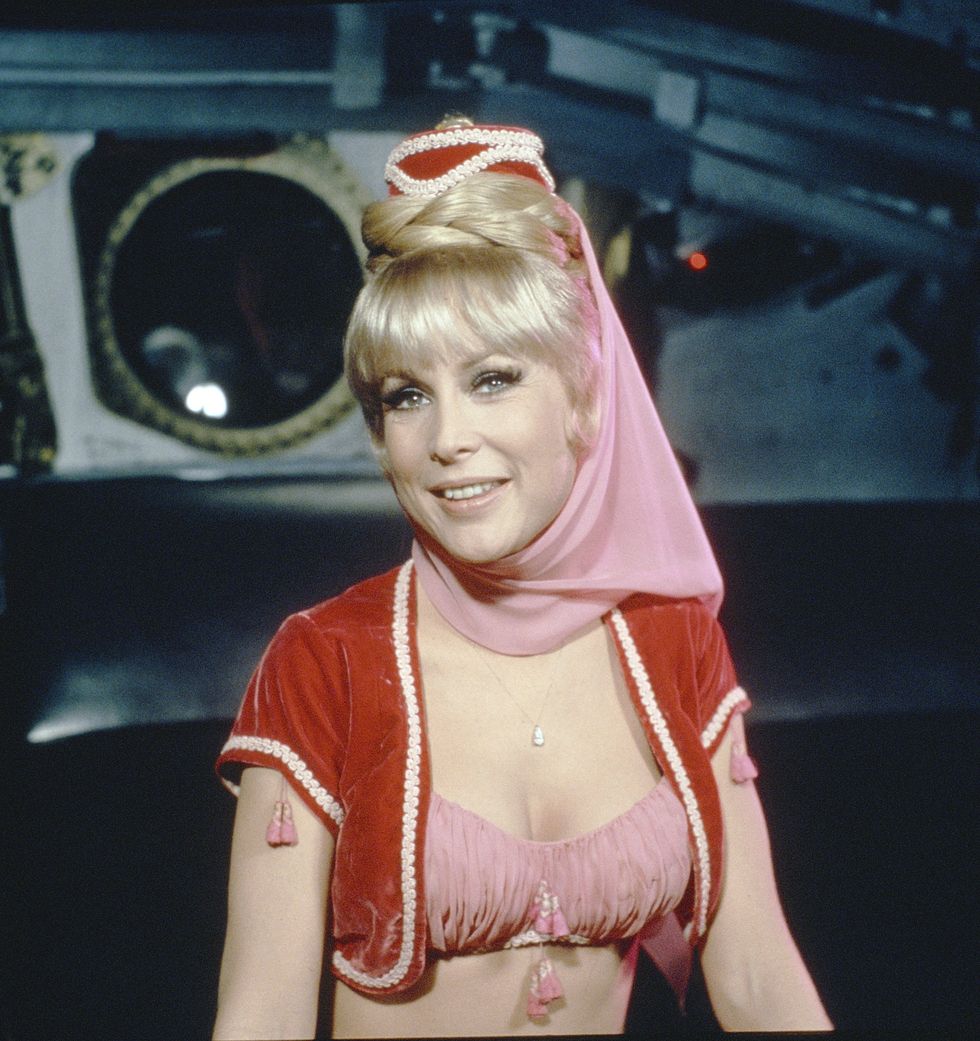To millions of viewers around the world, Barbara Eden will forever be remembered as the enchanting, bubbly Jeannie — a magical being who lived in a bottle, granted wishes, and made audiences laugh with her playful antics and unwavering devotion to her beloved “Master.” I Dream of Jeannie wasn’t just a television show; it was a fantasy, a glittering escape from reality in the form of pastel colors, slapstick humor, and Eden’s irresistible charm.
But behind that pink veil, behind the high ponytail and glittering smile, lived a woman carrying a lifetime of quiet heartbreak — a story rarely seen by the public who adored her.

The Grief No One Saw
In 1971, when Eden was at the height of her fame, she faced a tragedy that would have shattered many. She gave birth to a stillborn daughter — a moment of loss that she rarely spoke about in public but never forgot. While the world knew her as the radiant Jeannie, Eden returned to work just days after her devastating loss. She smiled for the cameras, delivered her lines, and twirled into scenes with grace — even as her own world had come undone.
“Grief doesn’t disappear,” Eden later reflected in interviews. “You just learn to walk with it.”
Years later, heartbreak would find her again. Her only son, Matthew Ansara — her pride, her joy, her “beautiful boy” — died of a drug overdose in 2001 at just 35 years old. Eden, once again, bore her sorrow with the same composure that marked her career. In public, she remained poised. In private, she mourned.
She never let grief define her. But it undeniably shaped her.

A Career That Sparkled — On Her Terms
Hollywood in the 1960s and 70s wasn’t exactly kind to women who refused to play by its rules. Roles were limited. Stereotypes ruled. Women like Barbara Eden — blonde, gorgeous, and feminine — were often slotted into narrow boxes: the ingénue, the love interest, the ditzy beauty.
But Eden was different.
She knew exactly what she was doing when she stepped into Jeannie’s lamp. She understood that the show was built around male fantasy — a beautiful, obedient woman in a sheer costume calling a man “Master” — but she refused to let it reduce her. Instead, she infused the character with intelligence, mischief, and curiosity. “Jeannie wasn’t dumb,” Eden once said. “She just didn’t know the rules.”
It was her subtle rebellion — a wink to the women watching, that even in fantasy, she was in control.
In fact, before Jeannie was even a dream, Eden had already proved herself as a serious actress. She studied at the San Francisco Conservatory of Music, began her career singing in nightclubs, and landed a contract with 20th Century Fox. She appeared in films alongside Elvis Presley, James Stewart, and Paul Newman. But it was television that truly made her a household name.

Enduring in a Changing World
While many of her peers faded from public view, Barbara Eden endured — and not by accident. She didn’t chase controversy. She didn’t rebrand herself. She remained grounded, gracious, and intentional in everything she did.
Her autobiography, Jeannie Out of the Bottle, offered readers a glimpse into her real life: the heartbreaks, the resilience, and the deep wells of strength beneath the sparkle. Fans were surprised by her candor — and moved by her honesty.
In one particularly poignant chapter, she wrote:
“I learned long ago that I couldn’t protect myself from pain, but I could choose how I walked through it.”
Eden didn’t rage against the industry that typecast her. She simply outlasted it. And in doing so, she became one of the few icons from the golden era of television to maintain not only relevance but reverence. Well into her 80s, she continued to appear at conventions, film cameos, and grant interviews — always with a kind word, a twinkle in her eye, and that unmistakable voice that carried both warmth and wisdom.
:max_bytes(150000):strip_icc():focal(749x0:751x2)/ansara-eden-1-4e9abad140aa41748b5ccb9b3b149d1e.jpg)
The Illusion That Wasn’t
Barbara Eden never claimed to be a feminist trailblazer. She didn’t break the rules — she bent them with a smile. She made Jeannie lovable, not laughable. And she made the world believe in magic, even when her own world was anything but.
She didn’t shatter the glass ceiling.
She floated above it.
She gave joy to a generation, even as her own heart quietly ached.
And that, perhaps, is the greatest magic trick of all.
Barbara Eden taught us that strength doesn’t always roar. Sometimes it wears sequins, blows kisses to a live audience, and shows up — day after day, year after year — even when no one sees the weight being carried.

She was never just a genie in a bottle.
She was — and still is — a woman who held on to grace, even when life tried to take it away.
And that legacy will never vanish.